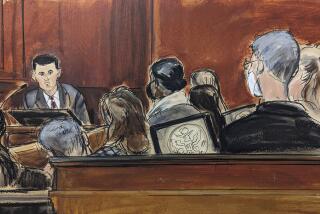Testimony Ends in Trial of Lay, Skilling
- Share via
HOUSTON — After more than three months and 54 witnesses, testimony ended Monday in the federal fraud and conspiracy trial of Enron Corp. founder Kenneth L. Lay and former Chief Executive Jeffrey K. Skilling.
The two defendants appeared upbeat shortly after the jury was released for the rest of the week.
“We feel real good about where we are right now,” Lay, 64, said outside the courthouse. “We think, in fact, in the end we’re going to prevail.”
“It’s been a long time coming,” Skilling, 52, told reporters.
The U.S. District Court jury of eight women and four men will return Monday to hear closing arguments over three days before deliberating the outcome of the premier criminal case to emerge from one of the biggest corporate scandals in U.S. history.
Both defendants testified as part of a 29-witness defense lineup. The government called 22 witnesses in its case, which rested March 28, including eight former Enron executives who have pleaded guilty to crimes, and three rebuttal witnesses Monday.
After the defense teams rested their cases midmorning, the government offered witnesses in rapid succession to reinforce prosecutors’ contention that Lay and Skilling committed crimes at the company before it spiraled into bankruptcy proceedings in December 2001.
Lay’s lead lawyer, Michael Ramsey, returned to court Monday after being absent for about a month after having two stents implanted in arteries to relieve blockage.
The government’s last rebuttal witness, former Enron employee Patti Klein, testified Monday that she tracked stock sales by top executives and would have liked to know Lay sold more than 1.7 million shares back to Enron in 2001.
Klein works at Portland General Electric, the Pacific Northwest utility Enron bought in 1997. The utility severed its ties with Enron last month and issued common stock as an independent company.
When Lay lawyer George Secrest asked whether Klein realized that Lay had acted legally when not disclosing the share sales, she replied that Lay had told workers and investors that Enron’s disclosures would be more transparent when he resumed as CEO upon Skilling’s abrupt resignation in mid-August 2001.
“His sales that I had tracked online were nowhere near those numbers,” she said. “Did it sound illegal? Not maybe necessarily, but it sure didn’t sound transparent.”
Skilling will await a verdict when deliberations begin, but Lay has another trial slated to start May 18. He is charged with bank fraud in a separate case, which will be tried before U.S. District Judge Sim Lake without a jury.
Prosecutors allege that he obtained $75 million in loans from three banks and reneged on an agreement with them not to use the money to carry or buy margin stock.
Skilling faces 28 counts of fraud, conspiracy, insider trading and lying to auditors and a maximum of 275 years in prison if convicted on all counts. Lay faces six counts of fraud and conspiracy that carry a maximum penalty of 45 years. Each of the four banking charges against Lay also carry a maximum penalty of 30 years.
More to Read
Inside the business of entertainment
The Wide Shot brings you news, analysis and insights on everything from streaming wars to production — and what it all means for the future.
You may occasionally receive promotional content from the Los Angeles Times.









